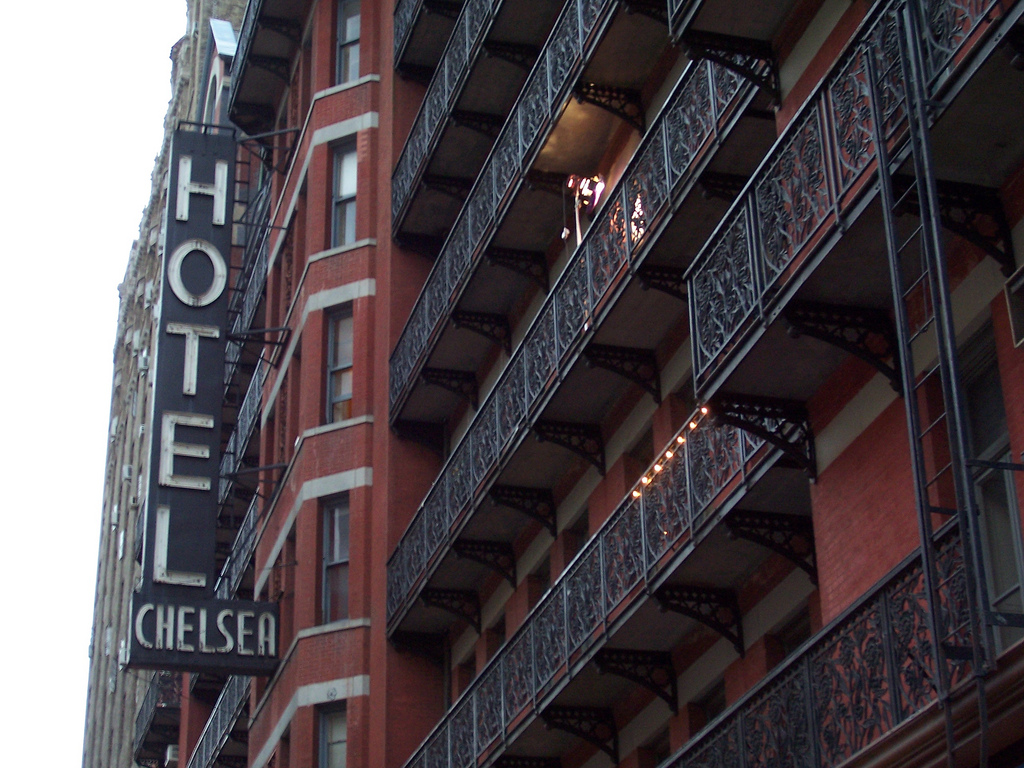GentriWatch: A Book About Gentrification, Published in Rapidly Gentrifying Somerville
Welcome to GentriWatch, where we look for signs of gentrification happening around the city.

Chelsea Hotel Photo by Shani Heckman on Flickr/Creative Commons
AUTHOR ED HAMILTON wants to show the human cost of gentrification.
Upon completing his first book, Legends of the Chelsea Hotel, Hamilton—still a resident of the storied New York City landmark, whose tenants have included Bob Dylan, Charles Bukowski, Janis Joplin, Arthur C. Clarke, and Sid Vicious—found himself at odds with developers.
“Right when [Legends] was getting published, the hotel was taken over by developers, and that just started a whole brouhaha. We fought them for a long time. We’re still fighting them—successfully in some sense, and others, not so successful,” Hamilton tells Boston magazine. “I guess after that, after fighting them and being tired out, I wanted to write some more about gentrification.”
 His new book, “about a struggle, and the result of a struggle,” is The Chintz Age, a collection of seven short stories and a novella. Its publisher, Červená Barva, is a small press located in Somerville, where gentrification is a hot-button issue.
His new book, “about a struggle, and the result of a struggle,” is The Chintz Age, a collection of seven short stories and a novella. Its publisher, Červená Barva, is a small press located in Somerville, where gentrification is a hot-button issue.
“It seems to be happening everywhere now. The strangest thing is, it’s not only in New York, it’s not only in Boston, but it’s in those little outlying areas like Somerville…even in little towns like Louisville, where I grew up,” Hamilton says. “Anybody who wants to live their life not solely in the pursuit of money and what have you—two-car garage or whatever—will be able to relate to this. It just seems like something weird has happened in our country, and in the whole world, where it seems like the 1 percent have decided to seize back the city from the people.”
Set in New York City, the characters of The Chinz Age are “forced to confront their own obsolescence in the face of a rapidly surging capitalist juggernaut.”
“[Gentrification] just destroys the culture it sought to co-opt. The rich people want to move in back to the city now because it’s cool and because there are artists there and cool mom-and-pop shops and things like that, but then they price them all out of existence,” Hamilton says. “It’s not even gentrification anymore. It’s not the gentry coming in, it’s just the speculators that are coming in. And they don’t care whether they rent some place out or not. They don’t care if people move in or not. It’s just to use it as they would a stock, and trade it.”
Červená Barva, which celebrated its 10th anniversary in April, will hold a launch party for The Chintz Age on October 30 at the Armory in Somerville.
• • •

Rendering via Boston Redevelopment Authority
THE BOSTON REDEVELOPMENT AUTHORITY will hold its second public meeting on the 100 Weld Street project, which proposes to build 17 condo units on the former site of a gas station on the Roslindale-West Roxbury line that’s laid dormant for the last decade. Because the proposed redevelopment conforms with the area’s current zoning, owner Horizon Development of Braintree would not be required to make any of the units affordable.
The meeting will be held at Roche Family Community Center in West Roxbury on October 5 at 6:30 p.m.
• • •
THE STATE’S HOUSING NEEDS were the topic of a hearing before the Joint Committee on Housing on Tuesday. The committee heard testimony on a bill sponsored by Rep. Kevin Honan of Brighton and Sen. Linda Dorcena Forry of Dorchester that would require all zoning ordinances and bylaws to include districts where multifamily homes are allowed by right, along with cluster developments to be permitted with planning board approval. Reports Katie Lannan of State House News Service:
“Massachusetts has a housing affordability problem because Massachusetts has a housing supply problem,” [Undersecretary of Housing and Community Development Chrystal Kornegay] said. “We don’t build nearly enough housing to keep up with demand, and when we do, it’s often the wrong type, and it’s often in the wrong place.” …
Proponents of the bill praised an increase in multifamily housing as a key economic factor, with housing costs less expensive in many of the states that compete with Massachusetts in the innovation industry and other sectors.
“If we want to attract and retain new workers, we need to create housing units for them to live in,” [Metropolitan Area Planning Council assistant data services director Tim] Reardon said.
• • •
THIS WEEK, WE floated the idea of restoring car traffic to Downtown Crossing as a possible means of revitalizing the area, and boy, did people hate it!
https://twitter.com/thejeffbyrnes/status/650004493317369856
@BostonMagazine I'd rather see another parking lot.
— Dr. Jeff (@drjefflo) October 2, 2015
https://twitter.com/CappyinBoston/status/649577600038371328
The piece, however, was packed with evidence of the contrary, that there’s little reason to turn back on the pedestrian mall, a defining feature of Downtown Crossing for nearly 40 years. The most colorful of all came from Peter G. Furth, a professor of civil and environmental engineering at Northeastern University:
“Why would anybody want to do that? Have you ever been down there and seen it’s packed with people? … People love the energy they get from seeing other people, being with other people. Having a large pedestrian area helps make that possible. If anything, the pedestrian area should be expanded. One of its weaknesses is that it’s a little bit too crowded with people. The number of people walking up and down Winter Street is like an exit from a football game or something. We need more pedestrian areas.”
Furth added that he’d love to see Newbury Street go carless. While you’re at it, why not Hanover too?


